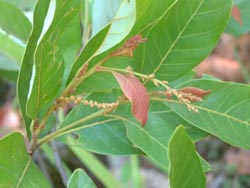
The three-angle oak, a time-honored arboreal species under the National protection of China, has been successfully propagated and cultivated by CAS botanists of the botanical garden under the CAS Kunming Institute of Botany (KIB) in Yunnan Province.
As a rare and endangered evergreen tree, three-angle oak (
Trigonobalanus doichangensis) is a cousin of oak in taxonomic affinity. It was recorded that the species was only distributed in north Thailand until Prof. Xu Yongchun, a Chinese expert of Oak family (Fagaceae) and other botanists from KIB, discovered and described its new distribution in South Yunnan. Genus Trigonobalanus includes three species and
T. doichangensis is the only one distributed in this country and its individuals are found sparsely scattered among the tropical and subtropical evergreen broadleaf forests at 1,000-1,700 meters above the sea level, in counties of Lancang, Menglian, Ximeng and Cangyuan of Yunnan. The distribution regions are situated in south parts of the Tropic of Cancer. As a primitive taxon in the family Fagaceae, it has highly scientific value in phylogeny of the family, and it is also an important plant species in the studies of the continental drift theory as well the global environmental changing. However, for many years, the tree has been used by the indigenous people as their firewood and raw material for making furniture and farming implements in Yunnan. Owing to the vegetation destruction, ecological degeneration and the overly exploitation, T.doichangensis now is threatened and being pushed to the verge of extinction
T. doichangensis has been designated as a key species in the CAS research project - Studies on the extinction mechanism of endangered plants and principles for their protection. Since 2001, KIB has initiated a large-scale field investigation and carried out a comprehensive research on its population ecology, genetic diversity, seed physiology and reproductive biology, leading to a complete success in its ex-situ conservation through propagation from seeds, and more than 1,000 individuals from five natural populations (including a population from Chiang-rai Province of north Thailand) have been conserved and cultivated at KIB's Botanic Gardens. The conserved plants at the botanical gardens has shown some satisfied features such as fast growth, anti-adversity (cold-resistance) and its annual growth can reach to some 70cm.
The evergreen tree is a potential ornamental plant because of its graceful plant-shape. In addition, it may be planted as the mainstream species in the current drive of reforestation to turn the reclaimed farmlands to be covered by their original vegetation in mountainous areas. Relevant scientists believe that the species germplasm resources can be effectively conserved and sustained utilized through the widely landscape cultivation and the mountain reforestation.





